北师大版(2019) 必修 第一册 Unit 1 Life Choices Lesson 2 Understanding and coping with stress 课件 (13页PPT)
文档属性
| 名称 | 北师大版(2019) 必修 第一册 Unit 1 Life Choices Lesson 2 Understanding and coping with stress 课件 (13页PPT) | 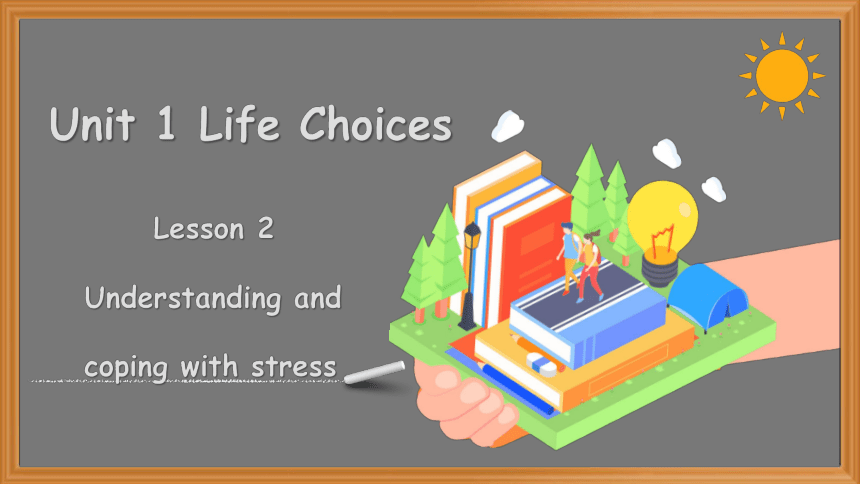 | |
| 格式 | zip | ||
| 文件大小 | 3.5MB | ||
| 资源类型 | 教案 | ||
| 版本资源 | 北师大版(2019) | ||
| 科目 | 英语 | ||
| 更新时间 | 2022-09-29 17:47:38 | ||
图片预览

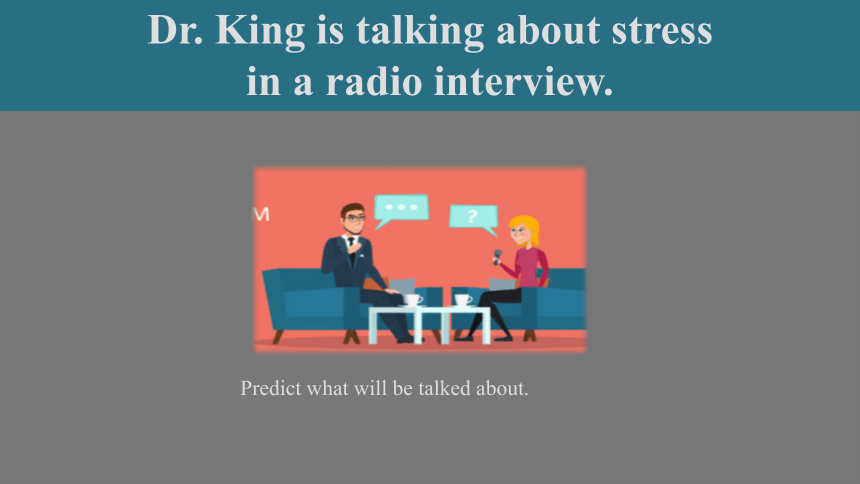
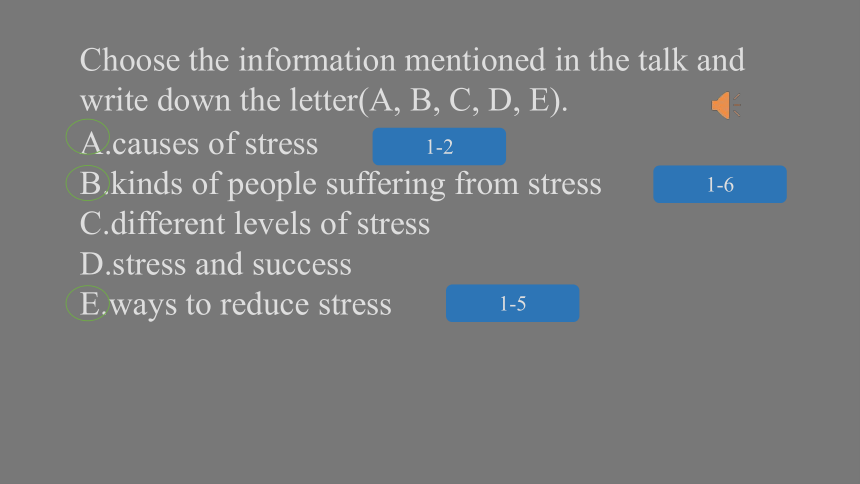
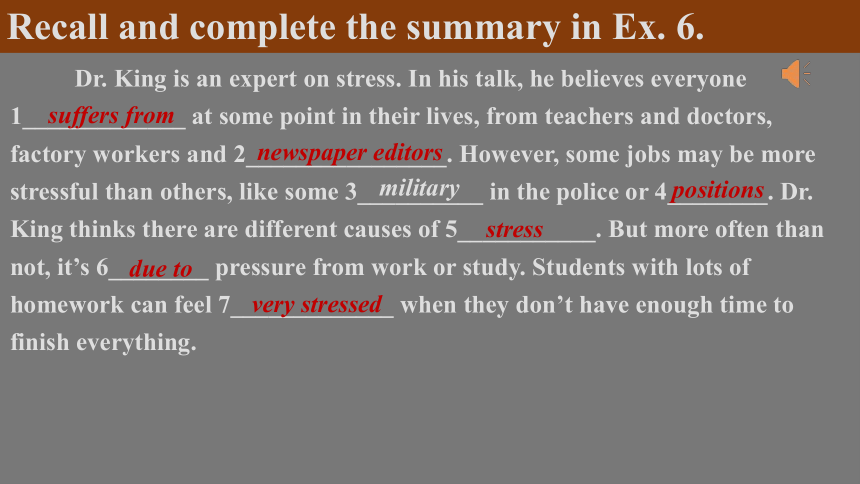
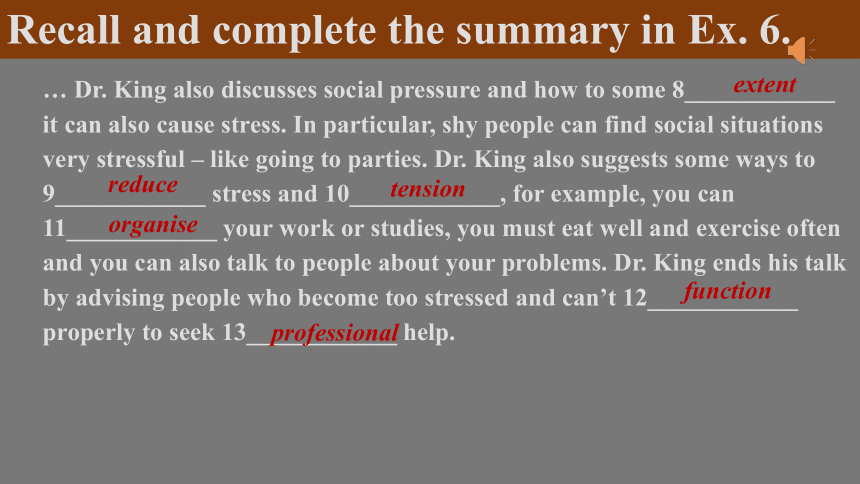
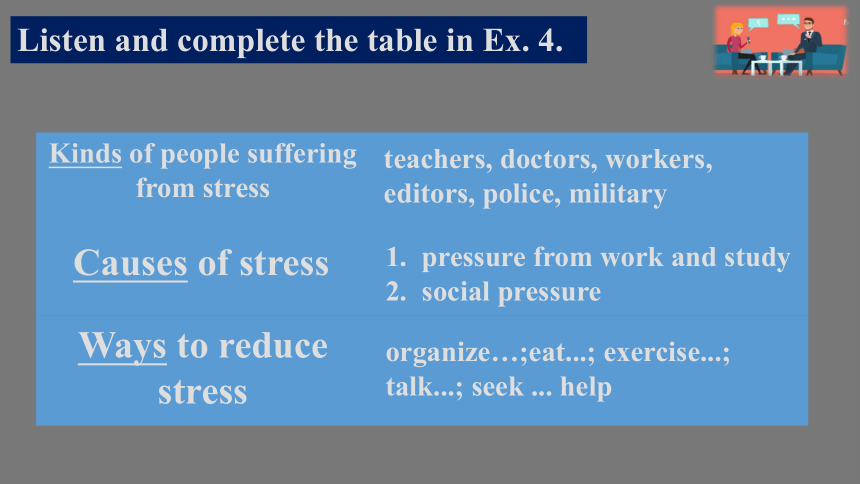
文档简介
(共13张PPT)
Unit 1 Life Choices
Lesson 2
Understanding and
coping with stress
Dr. King is talking about stress
in a radio interview.
Predict what will be talked about.
causes of stress
kinds of people suffering from stress
different levels of stress
stress and success
ways to reduce stress
Choose the information mentioned in the talk and write down the letter(A, B, C, D, E).
1-2
1-6
1-5
Dr. King is an expert on stress. In his talk, he believes everyone 1_____________ at some point in their lives, from teachers and doctors, factory workers and 2________________. However, some jobs may be more stressful than others, like some 3__________ in the police or 4________. Dr. King thinks there are different causes of 5___________. But more often than not, it’s 6________ pressure from work or study. Students with lots of homework can feel 7_____________ when they don’t have enough time to finish everything.
Recall and complete the summary in Ex. 6.
suffers from
newspaper editors
positions
military
stress
due to
very stressed
… Dr. King also discusses social pressure and how to some 8____________ it can also cause stress. In particular, shy people can find social situations very stressful – like going to parties. Dr. King also suggests some ways to 9____________ stress and 10____________, for example, you can 11____________ your work or studies, you must eat well and exercise often and you can also talk to people about your problems. Dr. King ends his talk by advising people who become too stressed and can’t 12____________ properly to seek 13____________ help.
Recall and complete the summary in Ex. 6.
extent
reduce
tension
organise
function
professional
Listen and complete the table in Ex. 4.
Kinds of people suffering from stress
Causes of stress
Ways to reduce stress
teachers, doctors, workers, editors, police, military
pressure from work and study
social pressure
organize…;eat...; exercise...; talk...; seek ... help
How to Make Stress Your Friend
When you change your mind about stress, you can change your body's response to stress.
Now, if you were actually in this study, you'd probably be a little stressed out. Your heart might be pounding(砰砰直跳), you might be breathing faster, maybe breaking out into a sweat. And normally, we interpret these physical changes as anxiety or signs that we aren't coping very well with the pressure.
But in the study, when participants viewed their stress response as helpful, their blood vessels stayed relaxed.
And this is really what the new science of stress reveals(揭示), that how you think about stress matters.
...the next time your heart is pounding from stress, you're going to remember this is my body helping me rise to this challenge. And when you view stress in that way, your body believes you, and your stress response becomes healthier.
People who spent time caring for others showed absolutely no stress-related increase in dying. Zero. Caring created resilience(恢复力,抗逆). And so we see once again that the harmful effects of stress on your health are not inevitable(不可避免的).
This stress hormone strengthens your heart, and the cool thing is that all of these physical benefits of oxytocin(催产素) are enhanced by social contact and social support, so when you reach out to others under stress, either to seek support or to help someone else, you release more of this hormone, your stress response becomes healthier, and you actually recover faster from stress.
巩固练习(填空&翻译)
How to make stress your friend1. Let me start with the study made me rethink my whole approach to stress. This study (track)30,000 adults in the United States for eight years...2. People who experienced a lot of stress but did not view stress as harmful (be) no more likely to die. 3. Now to explain how this works, I want you all to pretend that you are participants in a study (design) to stress you out. It's called the social stress test. 4. And normally, we interpret these physical changes as anxiety or signs thatwe aren't coping very well with the pressure.
5. But what if you viewed them instead as signs your body was energized, was preparing you to meet this challenge Now that is (exact) what participants were told in a study conducted at Harvard University.6. And participants who learned to view the stress response as helpful for their performance, well, they were less stressed out, less anxious,
(confidence), but the most fascinating finding to me was how their physical stress response changed.7. And this is one of the reasons that chronic(慢性的,长期的) stress is sometimes associated with cardiovascular(心血管) disease. 8. And this is really what the new science of stress reveals(揭示), that how you think about stress (matter).
Unit 1 Life Choices
Lesson 2
Understanding and
coping with stress
Dr. King is talking about stress
in a radio interview.
Predict what will be talked about.
causes of stress
kinds of people suffering from stress
different levels of stress
stress and success
ways to reduce stress
Choose the information mentioned in the talk and write down the letter(A, B, C, D, E).
1-2
1-6
1-5
Dr. King is an expert on stress. In his talk, he believes everyone 1_____________ at some point in their lives, from teachers and doctors, factory workers and 2________________. However, some jobs may be more stressful than others, like some 3__________ in the police or 4________. Dr. King thinks there are different causes of 5___________. But more often than not, it’s 6________ pressure from work or study. Students with lots of homework can feel 7_____________ when they don’t have enough time to finish everything.
Recall and complete the summary in Ex. 6.
suffers from
newspaper editors
positions
military
stress
due to
very stressed
… Dr. King also discusses social pressure and how to some 8____________ it can also cause stress. In particular, shy people can find social situations very stressful – like going to parties. Dr. King also suggests some ways to 9____________ stress and 10____________, for example, you can 11____________ your work or studies, you must eat well and exercise often and you can also talk to people about your problems. Dr. King ends his talk by advising people who become too stressed and can’t 12____________ properly to seek 13____________ help.
Recall and complete the summary in Ex. 6.
extent
reduce
tension
organise
function
professional
Listen and complete the table in Ex. 4.
Kinds of people suffering from stress
Causes of stress
Ways to reduce stress
teachers, doctors, workers, editors, police, military
pressure from work and study
social pressure
organize…;eat...; exercise...; talk...; seek ... help
How to Make Stress Your Friend
When you change your mind about stress, you can change your body's response to stress.
Now, if you were actually in this study, you'd probably be a little stressed out. Your heart might be pounding(砰砰直跳), you might be breathing faster, maybe breaking out into a sweat. And normally, we interpret these physical changes as anxiety or signs that we aren't coping very well with the pressure.
But in the study, when participants viewed their stress response as helpful, their blood vessels stayed relaxed.
And this is really what the new science of stress reveals(揭示), that how you think about stress matters.
...the next time your heart is pounding from stress, you're going to remember this is my body helping me rise to this challenge. And when you view stress in that way, your body believes you, and your stress response becomes healthier.
People who spent time caring for others showed absolutely no stress-related increase in dying. Zero. Caring created resilience(恢复力,抗逆). And so we see once again that the harmful effects of stress on your health are not inevitable(不可避免的).
This stress hormone strengthens your heart, and the cool thing is that all of these physical benefits of oxytocin(催产素) are enhanced by social contact and social support, so when you reach out to others under stress, either to seek support or to help someone else, you release more of this hormone, your stress response becomes healthier, and you actually recover faster from stress.
巩固练习(填空&翻译)
How to make stress your friend1. Let me start with the study made me rethink my whole approach to stress. This study (track)30,000 adults in the United States for eight years...2. People who experienced a lot of stress but did not view stress as harmful (be) no more likely to die. 3. Now to explain how this works, I want you all to pretend that you are participants in a study (design) to stress you out. It's called the social stress test. 4. And normally, we interpret these physical changes as anxiety or signs thatwe aren't coping very well with the pressure.
5. But what if you viewed them instead as signs your body was energized, was preparing you to meet this challenge Now that is (exact) what participants were told in a study conducted at Harvard University.6. And participants who learned to view the stress response as helpful for their performance, well, they were less stressed out, less anxious,
(confidence), but the most fascinating finding to me was how their physical stress response changed.7. And this is one of the reasons that chronic(慢性的,长期的) stress is sometimes associated with cardiovascular(心血管) disease. 8. And this is really what the new science of stress reveals(揭示), that how you think about stress (matter).
同课章节目录
- Unit 1 Life Choices
- Lesson 1 Lifestyles
- Lesson 2 Understanding and Coping with Stress
- Lesson 3 Your Life Is What You Make It
- Unit 2 Sports and Fitness
- Lesson 1 The Underdog
- Lesson 2 Rules of the Game
- Lesson 3 Running and Fitness
- Unit 3 Celebrations
- Lesson 1 Spring Festival
- Lesson 2 Special Occasions
- Lesson 3 Memories of Christmas
